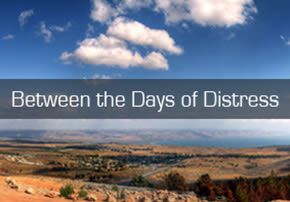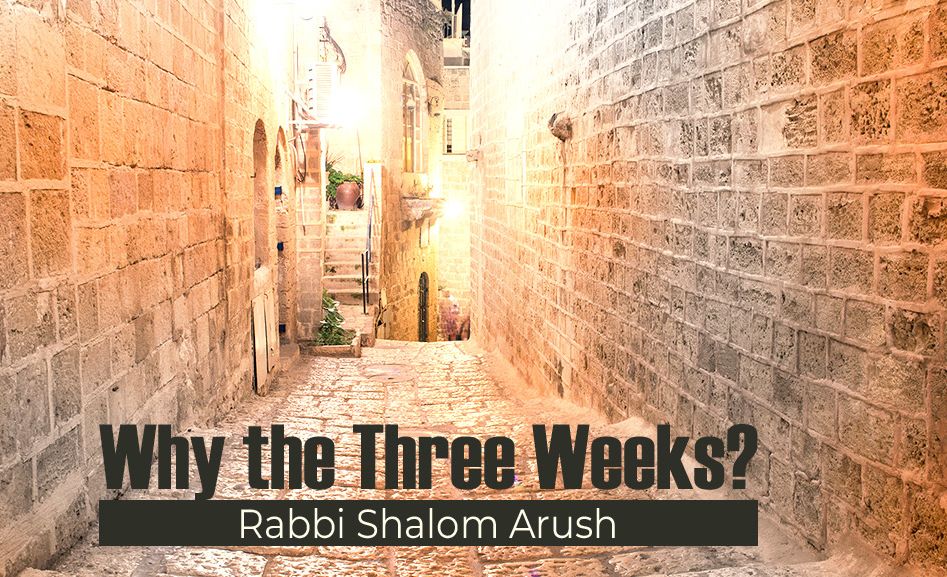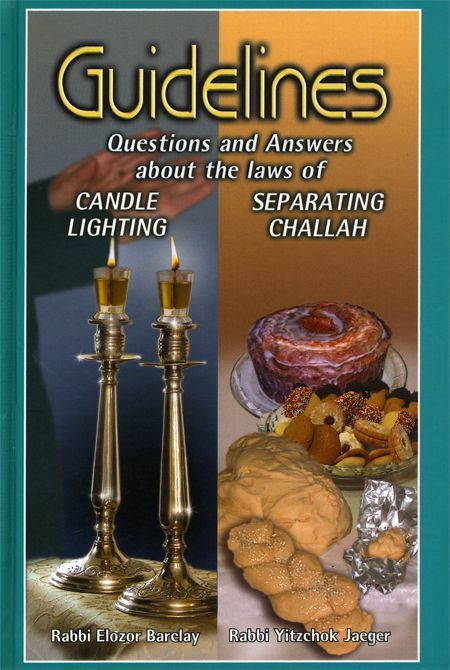
Between the Days of Distress
The Three Weeks is a time to strengthen ourselves and not to allow sadness and despair to let us fall into the trap of laziness and neglect in our Divine service.

Judah has gone into exile because of suffering and harsh toil. She dwelt among the nations but found no rest; all her pursuers overtook her in the narrow straits[in Hebrew, ‘bein hametzarim’].(Lamentations 1:3)
Rashi points out that the term “bein hametzarim” can be also translated as “between the days of distress”. It refers to the three weeks between the 17th of the month of Tammuz and the 9th of Av.
Parashat Maasei is always read during this time period, Bein HaMetzarim, the Three Weeks. There are 21 days in Bein HaMetzarim which are 21 days and 21 nights. These 42 periods correspond to the 42 journeys (or camping places) of the Jewish People in the desert before reaching the Land of Israel. These 42 stops  represent the major rectifications that a Jew must accomplish before Mashiach will come. Therefore these rectifications are especially relevant Bein HaMetzarim, the days in which we concentrate on rectifying the transgressions that caused us to be cast into exile. It is important to draw on inner strength and purify one’s heart to support and revive the spirit in order to continue serving G-d…
represent the major rectifications that a Jew must accomplish before Mashiach will come. Therefore these rectifications are especially relevant Bein HaMetzarim, the days in which we concentrate on rectifying the transgressions that caused us to be cast into exile. It is important to draw on inner strength and purify one’s heart to support and revive the spirit in order to continue serving G-d…
Needless to say, deep introspection during Bein HaMetzarim tends to engender anguish and sorrow over the destruction of the Temples. Therefore it is important to draw on inner strength and purify one’s heart to support and revive the spirit in order to continue serving G-d with holiness, learning and praying with joy. This is especially important when we sing the praises of G-d – in the Songs of Praise of the daily Morning Prayer, the Blessings of the Shema, and the traditional songs of Shabbat.
This idea can be understood more fully through an analogy of a king who has at his disposal every manner of worldly delight – good food and wine, resplendent furnishings in an opulent palace, verdant gardens and even performing minstrels, which combine to provide an altogether luxurious environment. Now obviously when the king is in a good mood, he doesn’t need all of these minstrels and singers. Once in a while, however, the king, absorbed by the problems and pressures of administering to his kingdom, sinks into a gloomy depression. It is then that he calls for his musicians to play for him and revive his spirits. The heavenly hosts and the angels are constantly singing their songs of praise to G-d…
Certainly the heavenly hosts and the angels are constantly singing their songs of praise to G-d. In fact the entire Creation never ceases singing the praises of G-d. Yet every year comes a period of sadness for G-d, Bein HaMetzarim, the time when He allowed Jerusalem to be breached and the Temple to be destroyed. Therefore those whose hearts are filled with the love of G-d need to support Him with their praises declaring, “‘Our Father, our King’ and ‘You are our Eternal Father’, You rule over us now and forever etc.”. Through extra concentration in prayer, reciting psalms, and singing, G-d’s spirit will be revived, so to speak, as we again crown Him our King.
This can be learned from the above verse, “…all her pursuers overtook her in the narrow straits (Bein HaMetzarim)…” All who pursue their G-dly service during Bein HaMetzarim will succeed. These days are particularly auspicious, like the holidays, to achieve spiritual growth. The twenty one days in Bein HaMetzarim correspond to the twenty one days of holiday rejoicing in the Jewish year: Shabbat (1 day), Rosh Chodesh (1),Pesach (7), Shavuot (1), Rosh Hashanah (2), Yom Kippur (1),Sukkot (7) and Shmini Atzeret (1). (Although sources speak about 21 days in Bein HaMetzarim, since they are also called the three weeks, there are actually 22 days. When we add the day of Tisha B’Av (1) which the Zohar states will in the future become a holiday, then there are 22 days of holiday rejoicing.)
The main thing one should take to heart during this time is to strengthen oneself and not to allow sadness and despair to let one fall into the trap of laziness and neglect in one’s divine service. Even on Tisha B’Av, which on the surface is a time of darkness (and it is a mitzvah to shed bitter tears over all that has happened to us on this day), we must still rejoice and gladden the heart of the King since Tisha B’Av is also the birthday of Mashiach, who will usher in the days when the entire world will know the Oneness of G-d. This means that since this day is one of national tragedy (but also this tragedy will in the future be rectified), then implicit in Tisha B’Av is a day of thanks and rejoicing. Let our exile and sadness be suspended forever…
With this in mind, the Seer of Lublin expounded on the words of the sages. (Megilla 5b) Rebbe (Rabbi Yehuda HaNassi) wanted to uproot Tisha B’Av when it fell out on Shabbat. “Since it is already postponed for one day”, he said (we fast on Sunday, only when Yom Kippur falls out on Shabbat do we fast on Shabbat), “let it be permanently postponed.”
Rebbe wanted to completely abolish the sadness and mourning of Tisha B’Av, when it came out Shabbat and thereby bring the final revelation of G-d’s presence in the world. Since it is already suspended in favor of the holy Shabbat for a day, let our exile and sadness be suspended forever! But the Sages did not concur with Rebbe, and they refused to join him in rescinding Tisha B’Av. It is impossible, they felt, to force the time of the Redemption.
“Perhaps Rebbe had a different intention”, said the Seer of Lublin. “When Rebbe wanted to uproot [in Hebrew, “la’akor”] Tisha B’Av, he wanted to make it the foremost [in Hebrew, “ha’ikar”, spelled with the same root letters as “la’akor”] amongst all the holidays of the year.
“On Tisha B’Av, although we are consumed with sadness and pain, we nevertheless, because of that sadness and pain, pray with a little more intention and yearn a little bit more deeply for the restoration of G-d’s glory in the world. This process of extracting the essence of the day and acting upon it to bring delight to G-d is the driving force behind the arrival of Mashiach. Once we suspend the mourning for a day, we can eliminate it forever.”
The sages though, could not agree with Rebbe. Although they understood Rebbe’s idea that Tisha B’Av should become foremost amongst all of our holidays, they could only agree as far as the individual in his personal divine service was concerned. But the end can’t be forced. We can only continue to serve G-d faithfully – with fear and joy, aspiring to the day when genuine peace will prevail. May that day come soon, Amen.
* * *
[Based on sources in Chasidut and Kabbala First published in B’Ohel Hatzadikim, Mattos-Massai 5760] Reprinted with kind permission of www .kabbalaonline.org










Tell us what you think!
Thank you for your comment!
It will be published after approval by the Editor.